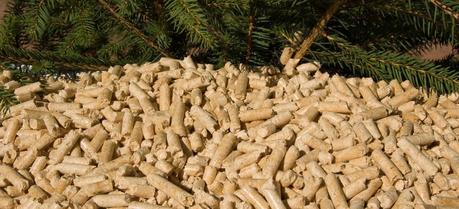 These wood pellets can be used as a fuel in heat boilers. (Credit: U.S. Department of Agriculture)
These wood pellets can be used as a fuel in heat boilers. (Credit: U.S. Department of Agriculture)
According to researchers at the Pennsylvania State University (Penn State), it is possible for some companies to economically convert their operations to wood power.
The conversion to wood boilers for heat and power would make the most sense for larger commercial and industrial operations in areas that have access to large timber resources and a friendly regulatory environment, said Charles Ray, assistant professor of wood products operations at Penn State.
Wood power is a renewable resource that could help contribute to the nation’s energy needs for an indefinite period, according to Ray.
“Theoretically, if we manage timber according to sustainable criteria, you could maintain it forever,” said Ray. “It could serve as a sustainable fossil fuel replacement.”
He added that although wood is currently uncompetitive with natural gas-powered boilers, in certain states wood power could compete with other fuel sources, such as oil, propane and coal. The most likely states for wood conversion currently are Maine, Texas, New York, Florida and Georgia, according to the researchers. Pennsylvania ranks 10th on the list.
While communities in Europe are adopting communal systems of wood boilers to generate heat and power for homes, U.S. customers seem reluctant to adopt a communal approach to heating and power generation, Ray said.
“Those kinds of operations would have both the money to invest in that size of project, as well as would have the resources for handling the wood,” said Ray.
He added that larger companies are more likely to have the resources to receive, store and load tons of wood chips and wood pellets that will fuel the boiler.
The researchers, who report their findings in the online version of the Renewable Energy Journal, used databases from the U.S. Energy Information Administration to estimate that there are 163,000 industrial and commercial boilers in use in the United States. Of those, they found that there were 31,776 oil, coal and propane boilers in 37 states in the Midwest, Northeast and South, the target region of their study. Those boilers generate the energy equivalent of 287 million barrels of oil a year.
If all of the boilers would be converted to wood-burning ones, they would consume about three times the wood available in the area, but that scenario is unlikely to happen, according to the researchers.
“It’s doubtful that all of those conversions would occur,” said Ray. “Only the conversions that would make the most economical sense would happen.”
Most wood boilers use wood chips or pellets. The country’s paper industry once consumed most of the wood chips to make paper, but the remaining paper mills consume far less wood now, Ray said. That availability makes wood more accessible for other purposes, including wood power and heat generation.
Biomass boiler conversion potential in the eastern United States (2013). Biomass boiler conversion potential in the eastern United States Renewable Energy, 62, 439-453 DOI: 10.1016/j.renene.2013.07.019
